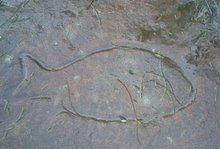Manly is now on Wikipedia! It needs more filling in, but it is good to be on the map.
15 August 2005
13 August 2005
Democracy and collective direction
 “The Council should do something about that!”
“The Council should do something about that!”
Is the local government a leading force in the area? Or does it only follow what the local community wants? Does the maintenance of a quality of life require active initiation by residents or can they be passive and expect the authorities to initiate actions to protect their life quality? Local government is an agency for the will of the community. They rarely initiate action. They respond to community pressure. If there is no community pressure, they will respond to other interests which exert pressure, such as the business community. In Manly, this group want to allow unlimited alcohol consumption right through the night, because they believe it is good for business. Drunks part with their money easily.
The community can exert pressure through elected representatives, whose role is to lead the local government. But without community support they will find this task difficult. Also, they are unable to raise all the issues which affect everyday life in a community. The other day I saw some resident (thinking of their own convenience but not of other people) had installed some powerful spotlights which blind all those who go walking on the Manly walkway to Cabbage Tree Bay at night. I thought “The council should do something about that!” But how would the administrators know? How would the elected representatives know? The only ones who could do anything would be those walking there, like me. The same applies to the other localised impacts on everyday life such as polluting cars, noisy vehicles, machine noise in the subs, and tree poisoning.
Often residents choose to be passive. The result is that the bullies determine life quality. Strong is right. Toughness prevails. The quality of life in the subs spirals gradually downwards. Local governments, in the interest of their own easy survival and secure employment, go along with the bully “consensus” only taking a tough stand on illegally parked vehicles and bicycles, or alternatively on those who make trouble by complaining.
Then the media wonders why there are bullies in schools.
10 August 2005
Projects to stay alive while moving about
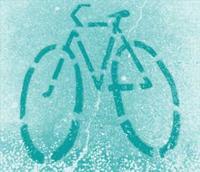 "...the car has become an article of dress without which we feel uncertain, unclad, and incomplete in the urban compound."
"...the car has become an article of dress without which we feel uncertain, unclad, and incomplete in the urban compound."
The Ghostcycles project in Seattle collects data from cyclists who have been involved in accidents. Patterns are established and action is taken. There is a Google map of all the places where cyclists were struck by cars, a form to report accidents and many useful links. In an auto-mobile culture like Australia such projects could aid in a transition to more sustainable means of transport. Some of the stats read like:
" 1 in 5 of the accidents involving another vehicle were hit-and runs"
" 74% of accidents resulted in physical injury and 35% resulted in damage to the bicycle 21% resulted in both. Only 13% of the accidents reported no damages."
There are many crosses and flowers lining roads in Sydney now, they seem to get denser and denser along the edge of the road. A mapping of the 'toll' could lead to changes or roads being blocked entirely to vehicles. There is even 'A Self-Help Program for Petro-Junkies'.
Birds coming and going...
Mostly unnoticed right in the busy Corso are the Figbirds (Sphecotheres viridis), seasonally visiting. Kookaburras even breeding successfully right on Manly beach. Soon their large old tree in which they nest will turn into a huge development site. With the old trees going and leaf litter blown away with noisy petrol machines they will have to set up 'Elsewhere'.
19.08.05 - There were six Figbirds sighted today eating white cedar fruit. They were very vocal, but no-one seem to notice them.
Enhancing ambience at Fairy Bower
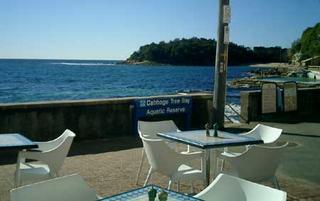 The Fairy Bower restaurant/café is one of the few places in Manly (Sydney?) where one can enjoy the Pacific directly and not have a noisy, stinking road separating the food and the ocean. The food and drinks are good, but the grumpy staff ensure the ordered goods get there cold or incomplete. Free expression of grumpiness ruins even the best of all natural environments. The ambience is ruined. This is a pity for a business that intends to be on the scene long-term and maintain a good reputation.
The Fairy Bower restaurant/café is one of the few places in Manly (Sydney?) where one can enjoy the Pacific directly and not have a noisy, stinking road separating the food and the ocean. The food and drinks are good, but the grumpy staff ensure the ordered goods get there cold or incomplete. Free expression of grumpiness ruins even the best of all natural environments. The ambience is ruined. This is a pity for a business that intends to be on the scene long-term and maintain a good reputation.
I suggest to eliminate the unpleasant interface between staff and customers, install Tablet PCs on the tables on which customers can compose their meals. On completion of the meal order, customers could pick up their (hot) dishes and optionally return the empty dishes. A personalised, competent service could be made available for a surcharge for digitally illiterate consumers or others desiring such a service. Such a business innovation would provide huge benefits for customers and the sustainablility of the business.
Update: 260807 The networked touch-screen sytem has been implemented in a restaurant now, saving personnel costs and keeping clientel in a good mood.
07 August 2005
Cabbage Tree Bay

Cabbage Tree Bay is one of Manly's nicest beaches. It is part of a marine reserve and is right next to Shelley Headland, an area of regenerated bushland. It is unusual for headlands in the city near beaches not to have houses packed onto them. This is the only west-facing beach in Sydney.
The bay was named after the cabbage tree palms which grew around the beach and up the creek. When Sydney was first colonised, the edible hearts of these beautiful palms were used for pig food and all the palms were cleared. All that remained of them was the name of the bay, and most people did not know why it had that name.
For the last several years, the Manly Council has been replanting cabbage tree palms at the beach and around the waterfront. Once again Cabbage Tree Bay has cabbage trees growing on it. Again there are palms on the beach where they belong.
Unfortunately, large motor boats have started using this bay as a parking lot on weekends, spoiling the visual unity of the bright blue water and the green headland and pumping petrol fumes into the fresh air where people are swimming.
06 August 2005
Beautiful beach, pity...
 Narrabeen beach is in the north of Manly, a long beach (3.2 km) with a row of houses, sliding into the ocean and a huge road right behind. The ocean water is of translucent tropical green, a few swimmers and surfies rolling in the gentle waves. From nowhere 3 jet-skies came flying over the waves at high speed, aiming right for the bodies of the swimmers. The petrol fumes stinking out the entire length of the beach for all walkers and residents. It is a wonder, that for the benefit of a few an entire beach can be used up. The patience of the surfies and swimmers is surprising, endangering their lives and not protesting. The tolerance of the house-owners to take the noise and fumes. But then, what the heck, if the whole house is sliding into the ocean! In the car-parks in between the houses, a shortage of space to park all the yob-mobiles with rockets at the back. The afternoon was just starting for a good bit of 'water sport'...
Narrabeen beach is in the north of Manly, a long beach (3.2 km) with a row of houses, sliding into the ocean and a huge road right behind. The ocean water is of translucent tropical green, a few swimmers and surfies rolling in the gentle waves. From nowhere 3 jet-skies came flying over the waves at high speed, aiming right for the bodies of the swimmers. The petrol fumes stinking out the entire length of the beach for all walkers and residents. It is a wonder, that for the benefit of a few an entire beach can be used up. The patience of the surfies and swimmers is surprising, endangering their lives and not protesting. The tolerance of the house-owners to take the noise and fumes. But then, what the heck, if the whole house is sliding into the ocean! In the car-parks in between the houses, a shortage of space to park all the yob-mobiles with rockets at the back. The afternoon was just starting for a good bit of 'water sport'...
05 August 2005
Lawn mowers
 Lawn mowers are not only a nuisance to neighbours, eliminating the peace and quite and filling the air with unpleasant-smelling and unhealthy gases. They are also a disaster for the environment.
Lawn mowers are not only a nuisance to neighbours, eliminating the peace and quite and filling the air with unpleasant-smelling and unhealthy gases. They are also a disaster for the environment.
One 2-stroke mower pumps out as much carbon-dioxide in an hour as 200 cars. A four-stroke mower isn't quite so bad in that respect, but adds considerably to ground level ozone causing summer smog.
Electric mowers are an alternative that may contribute to peace and quiet and have less impact on the atmosphere. Battery mowers are a more convenient variant without cables.
The best option of all is not to have a lawn. Growing other plants which do not need cutting is more pleasant to look at and creates a sustainable green space for enjoyment without noise. The most suitable plants are those endemic to the local area which will also support the local wildlife.
04 August 2005
The End of Suburbia
 Unimaginable, the beautiful castles, the endless lawns and interesting shopping malls should all be out of reach. The sprawl will grind to a halt with the end of oil. Watch some of the previews of The End of Suburbia (DVD), the beginning of the end of the subs, petrol depletion and the end of the ozzie dreaming, war to fill up that sub-urban tank. Surely they will have to come up with something to put into my tank!
Unimaginable, the beautiful castles, the endless lawns and interesting shopping malls should all be out of reach. The sprawl will grind to a halt with the end of oil. Watch some of the previews of The End of Suburbia (DVD), the beginning of the end of the subs, petrol depletion and the end of the ozzie dreaming, war to fill up that sub-urban tank. Surely they will have to come up with something to put into my tank!
Cuttle 'fish' all over Shelley beach
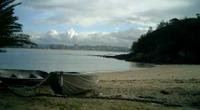 A walk on Shelley beach (03.08) at night exposed a beach littered in cephalopoda, you might know it as the "stuffed with…thing". Approximately 13 white cuttle 'fish' each 30- 40 cm long were lying all over the beach. 'Natural stranding?' They have been around for some 542 million years now and are still performing their rituals in the protected Cabbage Tree Bay area. Many large boats came right in in the last days and went about their 'business'. These strandings go unreported. Bait?,boat chemicals or just tangled in nets?
A walk on Shelley beach (03.08) at night exposed a beach littered in cephalopoda, you might know it as the "stuffed with…thing". Approximately 13 white cuttle 'fish' each 30- 40 cm long were lying all over the beach. 'Natural stranding?' They have been around for some 542 million years now and are still performing their rituals in the protected Cabbage Tree Bay area. Many large boats came right in in the last days and went about their 'business'. These strandings go unreported. Bait?,boat chemicals or just tangled in nets?
Some more images and information is here. Detailled scientific illustrations of anatomy and morphology of Sepia officinalis are here.
Hello golfer!
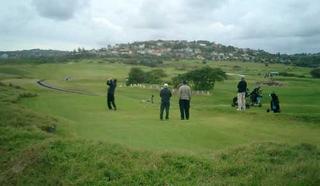 The Northern Beaches are studded with golf courses. Headlands have been cleared, lagoons and water-ways provide handy elimination of undesirable substances. The club houses are manicured to not get those white shoes soiled. The consumers of these services do not ask themselves what the negative impact is on the environment or their future generations. The need for hundreds of large cars to park, the industrial and chemical treatment of the large area. The noise scape created by industrial machinery. The ecological and economic impacts on the direct neighbourhoods. Responsible people would ask their 'recreational club' for a sustainability accounts. Make an informed consumer choices that does not negatively impact on people, fauna and flora.
The Northern Beaches are studded with golf courses. Headlands have been cleared, lagoons and water-ways provide handy elimination of undesirable substances. The club houses are manicured to not get those white shoes soiled. The consumers of these services do not ask themselves what the negative impact is on the environment or their future generations. The need for hundreds of large cars to park, the industrial and chemical treatment of the large area. The noise scape created by industrial machinery. The ecological and economic impacts on the direct neighbourhoods. Responsible people would ask their 'recreational club' for a sustainability accounts. Make an informed consumer choices that does not negatively impact on people, fauna and flora.
- It takes some 2.5 billion gallons per day to irrigate the world's golf courses, the same amount could be used to provide 4.7 billion people with the UN minimum of fresh water required.
- There are 18.0 pounds of pesticides used per acre annually in golf courses.
- Agriculture uses 2.7 pounds of pesticide per acre.
02 August 2005
Penguins or dogs?
 Read in the local paper recently that a resident cemented out the breeding hole of Manly little penguins. Today it was reported, that 2 dogs killed 15 of these little penguins in Tasmania, right in front of all the tourists who came to see them. (SMH 2.8.05, p.4)
Read in the local paper recently that a resident cemented out the breeding hole of Manly little penguins. Today it was reported, that 2 dogs killed 15 of these little penguins in Tasmania, right in front of all the tourists who came to see them. (SMH 2.8.05, p.4)
In the Harbour and at North Head speed boats have been racing (senselessly) endangering these diving birds. Dogs are allowed to go almost anywhere in Manly, either mostly unsupervised or free range on the beach at night or in possible penguin habitats.
Beyond rational decision-making, the residents seem to vote for dogs, rather than encouraging the diversity of unique animals in their 'back-gardens'. This is a consuming of the local habitat and degrading the value for any potential 'tourist-industry'. It is unsustainable, ecologically and economically.





